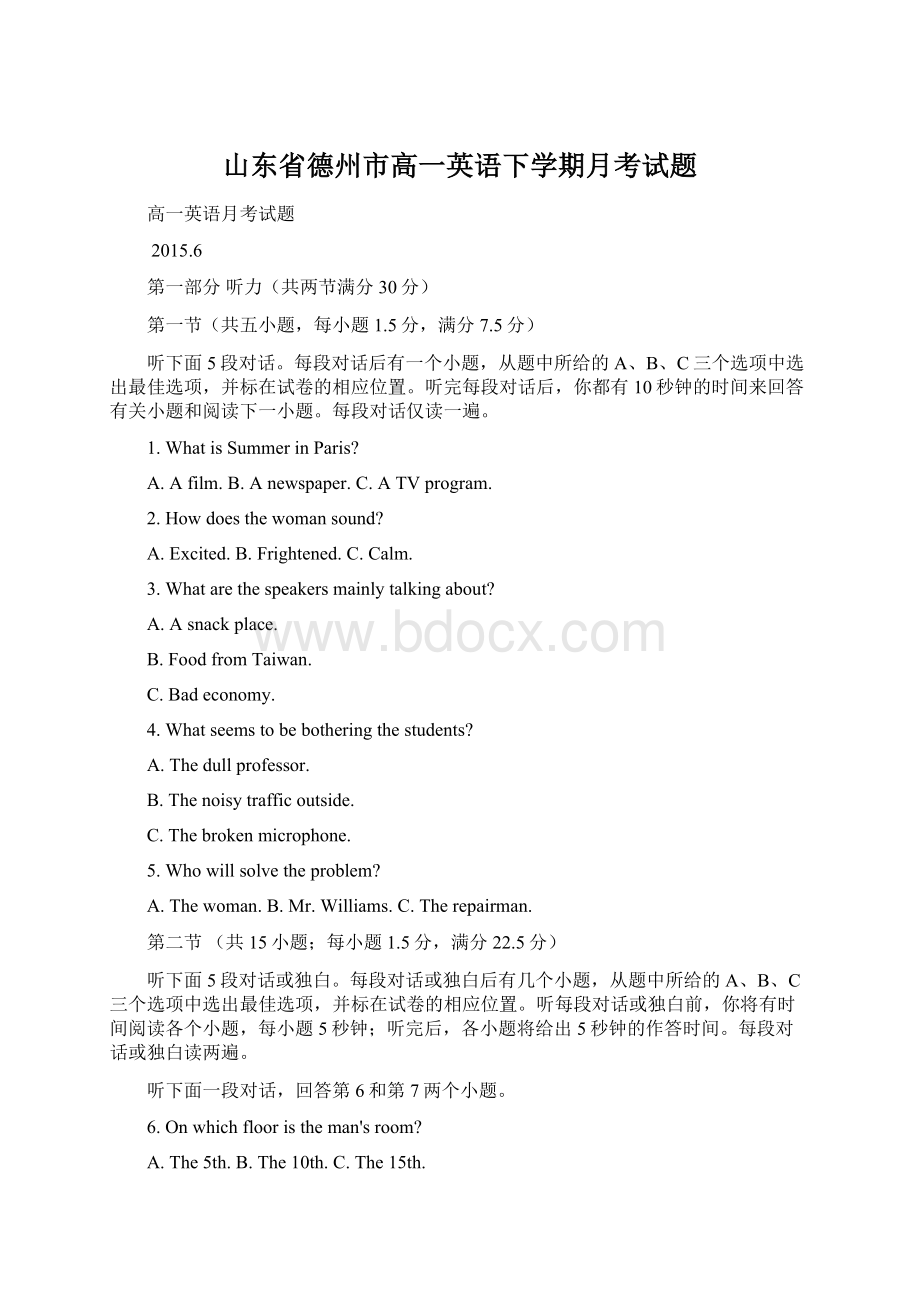山东省德州市高一英语下学期月考试题.docx
《山东省德州市高一英语下学期月考试题.docx》由会员分享,可在线阅读,更多相关《山东省德州市高一英语下学期月考试题.docx(12页珍藏版)》请在冰豆网上搜索。

山东省德州市高一英语下学期月考试题
高一英语月考试题
2015.6
第一部分听力(共两节满分30分)
第一节(共五小题,每小题1.5分,满分7.5分)
听下面5段对话。
每段对话后有一个小题,从题中所给的A、B、C三个选项中选出最佳选项,并标在试卷的相应位置。
听完每段对话后,你都有10秒钟的时间来回答有关小题和阅读下一小题。
每段对话仅读一遍。
1.WhatisSummerinParis?
A.Afilm.B.Anewspaper.C.ATVprogram.
2.Howdoesthewomansound?
A.Excited.B.Frightened.C.Calm.
3.Whatarethespeakersmainlytalkingabout?
A.Asnackplace.
B.FoodfromTaiwan.
C.Badeconomy.
4.Whatseemstobebotheringthestudents?
A.Thedullprofessor.
B.Thenoisytrafficoutside.
C.Thebrokenmicrophone.
5.Whowillsolvetheproblem?
A.Thewoman.B.Mr.Williams.C.Therepairman.
第二节(共15小题;每小题1.5分,满分22.5分)
听下面5段对话或独白。
每段对话或独白后有几个小题,从题中所给的A、B、C三个选项中选出最佳选项,并标在试卷的相应位置。
听每段对话或独白前,你将有时间阅读各个小题,每小题5秒钟;听完后,各小题将给出5秒钟的作答时间。
每段对话或独白读两遍。
听下面一段对话,回答第6和第7两个小题。
6.Onwhichflooristheman'sroom?
A.The5th.B.The10th.C.The15th.
7.Wheredoesthemanwanttogo?
A.Ahotel.B.Astore.C.Apark.
听下面一段对话,回答第8和第9两个小题。
8.What'stheweatherlike?
A.Sunnybutcold.B.Warmanddry.C.Coldandrainy.
9.Whatdidthewomanbuyforhercousin?
A.Asweater.B.Ascarf.C.Ahat.
听下面一段对话,回答第10至第12三个小题。
10.Whatistheprobablerelationshipbetweenthespeakers?
A.Colleagues.B.Classmates.C.Friends.
11.Whatshouldthemandofirst?
A.Getfamiliarwiththedifferentnumbers.
B.Learntousethefaxmachine.
C.Checkthedata.
12.Whosedictionaryisavailable?
A.Thewoman's.B.Tom's.C.Jim's.
听下面一段对话,回答第13至第16四个小题。
13.Whydoesthewomancalltheman?
A.Toinvitehimtoaparty.
B.Toaskhimtobuysomefood.
C.Toaskhimtosendsomeinvitations.
14.WhatdoesthewomansayaboutBen?
A.HeisleavingFrance.
B.Hehasbecomeateacher.
C.Hewillworkforamagazine.
15.Whowillattendtheparty?
A.Ben'steachers.
B.Ben'sparents.
C.Ben'sworkmates.
16.Whenwillthespeakersmeet?
A.At8:
45.B.At9:
00.C.At10:
00.
听下面一段独白,回答第17至第20四个小题。
17.Whoisthestudyfocusedon?
A.Parents.B.Students.C.Workers.
18.Whatcanbecausedbyskippingbreakfast?
A.Aterriblesleep.B.Abadmood.C.Apoormemory.
19.What'soneofthereasonsfornothavingbreakfast?
A.Tosleeplonger.
B.Tosavemoney.
C.Togettoschoolearly.
20.Whatisthepassagemainlyabout?
A.Theimportanceofbreakfast.
B.Thewaytohavebreakfastproperly.
C.ThevariousbreakfastinBeijing.
第二部分阅读理解(共两节,满分40分)
第一节:
(共15小题,每小题2分,满分30)
阅读下列短文,从每题所给的四个选项(A,B,C和D)中,选出最佳选项,并在答题卡上将该项涂黑。
A
Itisreportedthatjustbylisteningtoaforeignlanguage,youcanfinditmucheasier.Yourbrainisprocessingtheinformationevenifyouarenotawarethatyouareactuallylearning.Itisasimpleconcept,really.Anewborncannotknowwhatanyoneissayingorwritedownwhathehears,butthroughrepetitionofthesamesound,hecanlearnalanguage.
Actuallywealllearnourfirstlanguagebythislisteningapproach.Thereisnoonetoreallytranslateanythingtous.Youprobablydidhaveparentswhopointedatthingsandwouldpronouncethemtoyou,buttheydidnotsitdowntoteachyourgrammarrules.Allthesearethemethodsoftenusedtolearnanewlanguageatschool;itisverydifficultforustoacceptanewwayoflearning.
Thatisnottosaythatyoushouldnotusevocabularywordlisttohelpyoulearn.Youjustneedtosupplythislearningbypassivelistening.ThankstothearticleIreadbychanceinthenewspaper,IstartedtolistentoEnglishradiobroadcastseveryday.AsfirstItooknonoticeofit,becauseIhadnoideawhatwasbeingsaid.ButIsoonrealizethatIcouldunderstandwords,eventhoughIcouldnotunderstandeverythingthatwasbeingsaid.Myearsbeganto“pickout”wordsthatIrecognized.Inolongerpickedupotherprograms.Insixmonths,Ihaveavocabularyofabout1,000Englishwords.Nowyoucanseethemoreexposureyouhavetothelanguageyouaretryingtolearn,theeasieritisgoingtolearnit.
21.Whatcanwelearnfromthepassage?
A.Listeningisthemainwayfornewbornstolearnalanguage.
B.Moreandmorestudentsbegintodomuchlisteningpracticeatschool.
C.ThewriterusedtolistentoEnglishprogramscarefullyeveryday.
D.Weshouldknowthenewwordsaheadoftimebeforelearningaforeignlanguagethroughlistening.
22.HowdidthewritergettheideaofimprovinghisEnglishthroughlistening?
A.heknewitfromhisteacher.
B.Hehearditfromtheradio.
C.Hegotitbywatchingnewbornslearntospeak.
D.Helearnedaboutitthroughthenewspaper.
23.WhenthewriterfirstlistentoEnglishprogramshe_________.
A.couldnotfollowthespeaker.
B.showedmuchinterestinthem.
C.triedtopickoutthewordshecouldunderstand.
D.foundhecouldincreasehisvocabularyveryquickly.
24.Howdidthewritergethisideaacross?
A.withfactsandtheories.
B.withfiguresandexplanations
C.withcomparisonsandpersonalexperiences.
D.wit